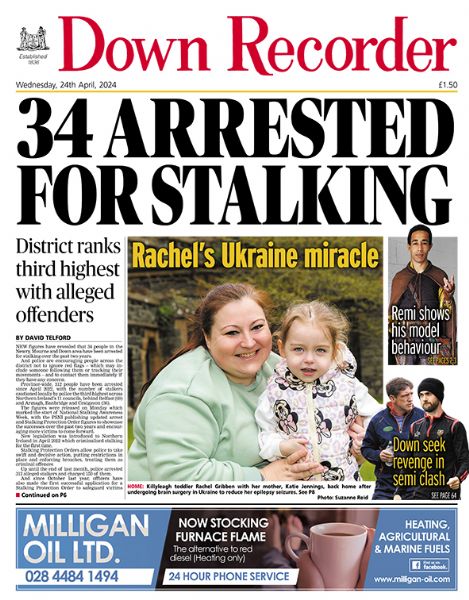Report unveils savage truth
Report unveils savage truth
15 June 2016
BACK in 2011 the Loughinisland families angrily condemned the original Police Ombudsman’s report as a whitewash.
Al Hutchinson had outlined what he thought were a series of failures in the police investigation, but stopped short of saying there was collusion.
He said these failures didn’t amount to collusion as he understood the term and that he was satisfied none of the suspects in the massacre were afforded protection.
“I can understand the families trying to grasp all these cumulative failures over the years,” he said at the time. “But was it deliberate? Does it stack up against the definition of collusion? No.”
Mr Hutchinson denied he was working under a definition of collusion narrower than that held by his predecessor Nuala O’Loan or by retired Canadian judge, Peter Cory, who investigated several controversial killings during the Troubles.
While concerned that there was no agreed definition, he said he and Baroness O’Loan “would share the view that there has to be intent and evidence of intent.”
In 2011, three independent reports were highly critical of the work being carried out by the Ombudsman’s office and by January 2012 Al Hutchinson had stepped down from his role.
For his part, Mr Hutchinson said he had “received expressions of support from a number of quarters” but “it is clear that there remains a focused campaign to have me resign immediately”.
One of the critical reports was by the then Criminal Justice Inspector, Dr Michael Maguire.
His report commented on the “flawed nature of the investigation processes in historical cases” and “concerns around the handling of sensitive material and divisions within senior management”.
Having spent months identifying problems within the office, Dr Maguire was asked to take on the role of Police Ombudsman.
The families, meanwhile, had been pursuing High Court action to get the original Police Ombudsman’s report into Loughinisland quashed and by December 2012 had achieved this. There was no opposition from the new Ombudsman who told the court he intended to open a new investigation.
Dr Maguire’s new report, finally released this week, blows out of the water Mr Hutchinson’s view that informers weren’t protected and that Special Branch had no direct involvement in the Loughinisland case.
The 160 page report makes public for the first time some of the detailed information informants provided and how this led to the recovery of a substantial number of weapons. But it also questions how a significant number ended up in the hands of Loyalist terrorists.
Dr Maguire said the police approach to informants was a concern which appeared time and time again throughout this investigation.
“We have seen occasions when informants contributed to both the saving of life and the loss of life,” he said.
“The report evidences instances when police were content not to ask these people for information about serious crime: instances when people volunteered such information and police chose not to act upon it and instances when informants were protected from investigation.
“Some police officers appeared to have placed more value on gathering information and protecting their sources that on the prevention and detection of crime.”
The fact that the murder suspects may have been warned by a police officer they were going to be arrested in 1994 is among the revelations.
“Many of the individual issues I have identified in this report, including the protection of informants through wilful acts and the passive turning a blind eye; fundamental failures in the initial police investigation and the destruction of police records, are in themselves evidence of collusion as defined by Justice Smithwick,” he said.
“When viewed collectively, I have no hesitation in saying collusion was a significant feature of the Loughinisland murders.”
Both Dr Maguire and his predecessor said they had been hampered by some officers’ refusal to talk and Dr Maguire said this week that he agreed there should be a “lifetime of accountability”.
“I want to hear what they have to say,” he said.
Asked at Thursday’s press conference why there had been such a sea-change between his report and that of Mr Hutchinson, he said: “What we investigated was much broader than what was investigated last time round.
“It was clear there were some areas of the investigation that hadn’t been explored properly such as the arms importations, the precursor events and indeed some aspects of the investigation.”
Dr Maguire said he had visited the Loughinisland families in person the night before the report was released to outline his findings.
“It was an emotional event, there is no two ways about it,” he said “I think they have been failed over the years in order to have to fight to get answers to these questions.”
Mr Hutchinson also didn’t fully extinguish the hope of criminal prosecutions for the families.
“I think there should always be hope, it is an open investigation,” he said. “But clearly as time progresses the potential for gaining evidence that would meet the tests of criminal prosecution is going to difficult but I don’t think we should ever give up hope.”

